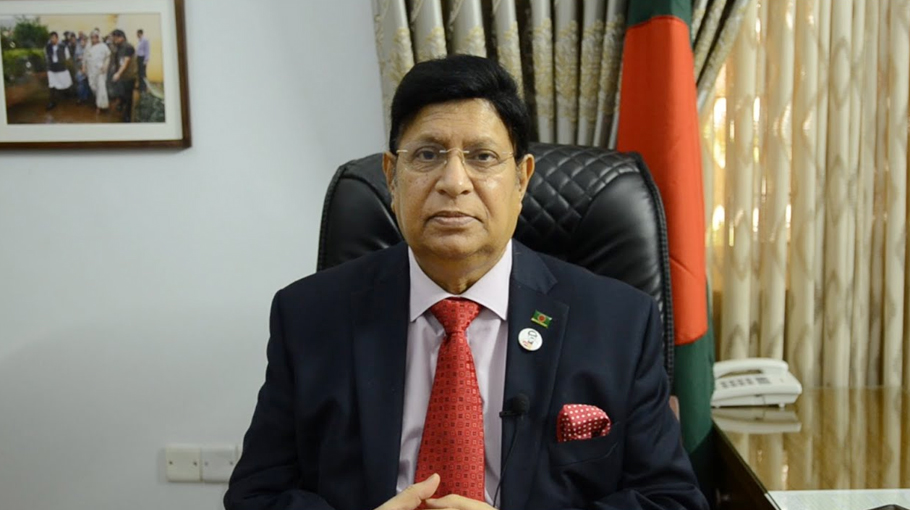Multilateralism only solution to global problems: FM

Foreign Minister Dr AK Abdul Momen on Monday stressed on 'multilateralism' to solve the global problems.
He also emphasised on strengthening the UN system so that it can "cater the need of our peoples; to reflect the voice of every country, not only of a few."
Dr Momen was speaking at a function on UN Day.
Referring to the pandemic, he said the invisible enemy with whom the world has been fighting for the last two years is "yet another reminder that solidarity is our first and best line of defense."
"Multilateralism is the only solution," he said.
Read more: ‘Ensure safe walking route to school’
"As we are reeling with the pandemic, more than ever before we share a common destiny. More than ever before we need to unite as “we the peoples.”
"We need to strengthen the organidation to cater the need of our peoples; to reflect the voice of every country, not only of a few.
"Secondly, UN is a great institution to help humanity, however no one should abuse the advantage of its universality and acceptability," he said.
"However, despite best efforts, the world is still inflicted with chaos and brutality. Inhumane persecutions and ruthless emergencies and due to spread of venom and intolerance of hatred are still driving millions away from their homelands in search of safety. Rohingyas in Myanmar are glaring examples."
For Bangladesh, the foreign minister said, this year bears a special significance.
This year marks the Golden Jubilee of our independence. We are also celebrating the Birth centenary of the Father of our Nation Bangabandhu Sheikh Mujibur Rahman, an indomitable leader, a staunch supporter of multilateralism, holding whose hands Bangladesh joined the global assembly in 1974. The twin celebrations have added a new dimension to the UN day anniversary, he said.
"Inspired by the ideals of this great leader, Bangladesh remains steadfast to the principles of UN charter.
"Our peace-centric foreign policy has guided us to be at the forefront of UN’s peace pillar. Today we are hailed high in the UN Peacekeeping Missions. We are actively supporting the Women, Peace and Security (WPS) agenda. Our signature initiative, culture of peace has been disseminating a strong message of peace and solidarity; a mindset of tolerance and respect for each other, irrespective of race, ethnicity, color and religion.
"Our quest for global peace inspired us to champion the cause of complete disarmament," he said.
We have brought people at the center of our national development.
One of our key development strategies is to address inequality through social safety net programmes.
Our pragmatic approaches generated tangible results and helped us to reduce poverty by half.
The infant mortality rate has been reduced to 23.67 per 1,000; maternal mortality rate to 173 per 100 thousand live births. Bangladesh today is a role model for women empowerment.
Our achievements in education especially girls’ education have been widely recognized. We thank UN for supporting us in our national initiatives.
As the world is grappling with the unprecedented crisis caused by COVID19 pandemic, our people-centric approach kept our economy alive and vibrant.
Read more: Global Covid cases near 244 million
Our responses included 28 stimulus packages to the tune of US$ 14.6 billion or 4.44% of our GDP. Amidst global vaccine politicization and vaccine inequity, we are trying to ensure vaccine for all within our borders and have allocated 1.61 billion USD for vaccines.
When we are rebuilding our economies from the onslaughts of the pandemic, we must use this opportunity to build back better. Climate change remains a significant threat.
All of us are facing the storm but not all of us are on the same boat. For countries like ours it is an existential threat-an everyday struggle, when our contribution to this is almost zero.
Each year thousands of people are being uprooted from their sweet homes and traditional jobs and move to towns and cities creating slums.
They are uprooted not become of our government’s fault but due to global warming. However, our government tries to rehabilitate them.
It should be the responsibility of global leadership especially those who are mostly responsible for global warming to help share the burden of rehabilitation.
We are looking forward to a meaningful outcome from Glasgow Conference. We are helpful, we must take decisive action now, not tomorrow.
Together, we must find a way to reduce harmful emissions to net zero by 2050. And we must keep the goal of limiting global warming to 1.5 degrees.
In order to stop global warming, Bangladesh cancelled its 10 coal based power plant projects work of 12 billion FDI and thus shows the world to come forward with decisive action, said the foreign minister.





